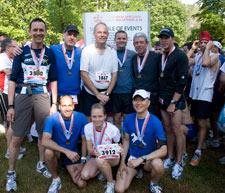There aren’t any million-dollar sponsorship deals or marketing campaigns featuring cute, fuzzy mascots. But members of Vancouver’s gay sports community say the World Outgames in Denmark are their chance to showcase the Olympian values of sportsmanship and friendly competition.
“Having been to the Games before, I can see how it builds camaraderie,” says Dan Quon, a runner and president of Team Vancouver, which helps organize local athletes for the Games. “It’s a very good feeling when people go there and see gay and lesbian athletes participate in the sport they love.”
Approximately 30 members of Team Vancouver will join an estimated 5,000 athletes from 90 countries heading to Copenhagen for the Games, which offer events ranging from the usual track and field to ballroom dancing, bridge and golf.
That number of Team Vancouver participants marks a sharp decline from previous years due to financial barriers, Quon notes.
“In the past, for example in Sydney Gay Games [in 2002] and the Montreal Outgames [in 2006], we’ve sent as many as 400 athletes,” he says. “For a number of reasons — the economy, the distance and the cost of living in a nice city like Copenhagen — a lot of people have decided to sit this one out.”
Originally launched as a spin-off of the Gay Games after a dispute between the Federation of Gay Games and the Montreal organizers of the 2006 Gay Games split the gay sports community, the Outgames now run every two years, with hosts alternating between a North American city (for the North American Outgames) and a city outside the continent (for the World Outgames).
Vancouver has been selected to host the next North American Outgames, scheduled for 2011.
More than just a sports or social event, Outgames CEO Uffe Elbaek says the festival, which features a sports competition, cultural festival and human rights conference, also provides a forum for the international gay community to advocate for an end to discriminatory treatment.
“[The] World Outgames will definitely offer a lot of sports, big parties and many fantastic opportunities to meet people from all four corners of the world,” Elbaek explains. “But it is important not to forget that there are many homosexuals who suffer from oppression purely because they love someone of the same gender.”
In this spirit of solidarity, the Outgames runs its sports events differently than the mainstream. Unlike internationally sanctioned competitions, players from different countries are allowed to compete together in team sports. This ensures that solitary athletes, particularly those from countries where gay athletes are discouraged, have the opportunity to participate.
In a similar effort at outreach, organizers subsidize travel costs for athletes travelling from countries in Eastern Europe, the Middle East, Africa, Asia and Latin America, where discrimination against gay people tends to be more widespread.
The result makes for some interesting stories of international cooperation. After two members of his Vancouver 4 x 100 m relay team were injured in Montreal, Quon found an American and an Eastern European to replace them.
“We pulled it together the day before the race, trained a little together and went for it,” he says. Together the impromptu team won a bronze medal, while Quon personally went on to win silver in the 400 m and bronze in the 800 m.
Vancouver volleyball player Thai Lam says he and his beach volleyball partner, Rome Lavrencic, plan to register with a group from Oregon so they can play in the six-person floor volleyball event.
Lam says he’s used to forming teams through “mix and match” at tournaments hosted by the North American Gay Volleyball Association and at the 2006 Outgames in Montreal.
Though it takes some time to figure out the group dynamics, he says working with strangers emphasizes the importance of teamwork and breaks down barriers between competitors.
“It’s such a remarkable experience to have people from all over the world come together and organize on the spot, with all the bonding and friendships that come with it,” he says. “It makes it easier to have fun in a competitive environment.”
Some Vancouverites plan to use the Outgames as a teambuilding exercise for their clubs — or a good excuse for a vacation.
Nine members of the Vancouver amateur running club the Front Runners will be attending the Outgames, including some who have never competed before.
As a club that includes runners of all abilities, getting encouragement from peers is one of the best motivators to improving one’s performance, says Front Runner Jag Bilkhu.
“In training, for example, it will be Wednesday evening and you won’t necessarily feel like running, but because you know someone’s expecting you to be there, you show up,” says Bilkhu, who is competing in the half marathon.
“Having peer pressure and group support really helps, particularly when you’re travelling for longer distances.”
When it’s all over, Front Runners president Patrick Tham intends to take advantage of the trip, enjoying Copenhagen’s storied gay nightlife (the Outgames are timed to coincide with the city’s Pride week) and going on a cruise with friends to nearby Sweden and Estonia.
“Running’s a unique sport. It’s one thing you can do practically anywhere, so there’s normally no compelling reason to go to Scandinavia,” Tham points out. “Since I’m going for the Outgames, I want to enjoy every minute of it.”
“We’re very excited about exploring the land of the blond.”
Keeping the competition factor low while emphasizing sports as a social outlet is what makes events like the Outgames so enjoyable, Quon says.
“Some of them have trained hard and some of them are just happy to be part of the game, but everyone has a good time.”

 Why you can trust Xtra
Why you can trust Xtra


